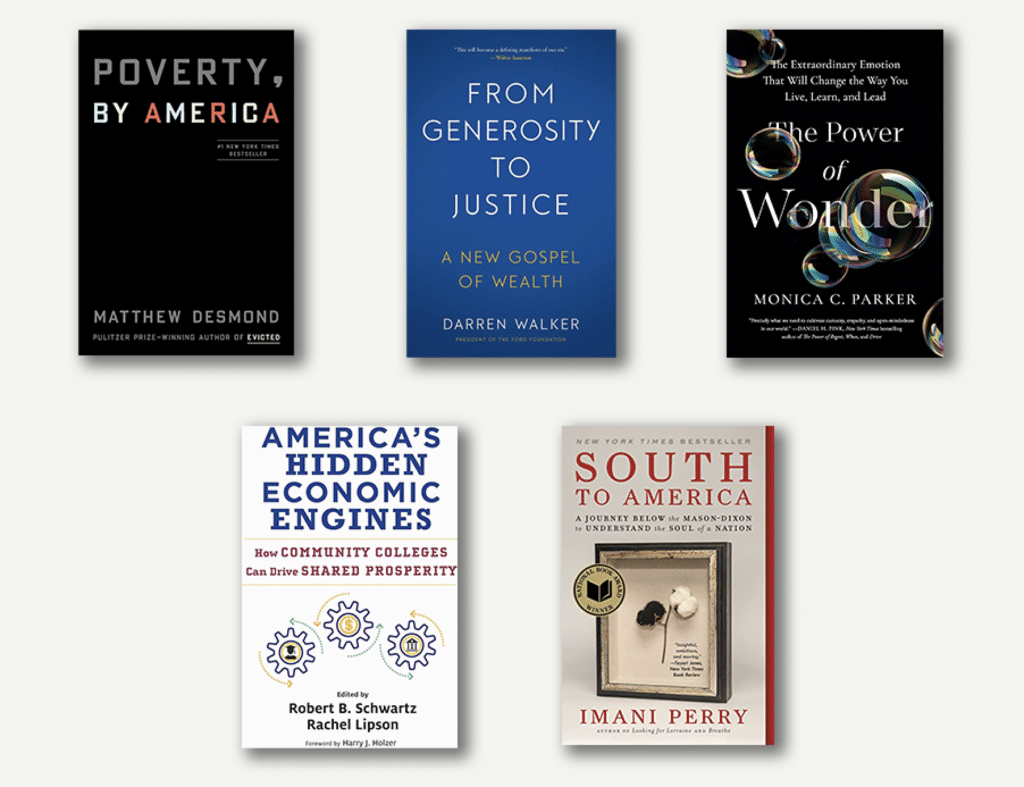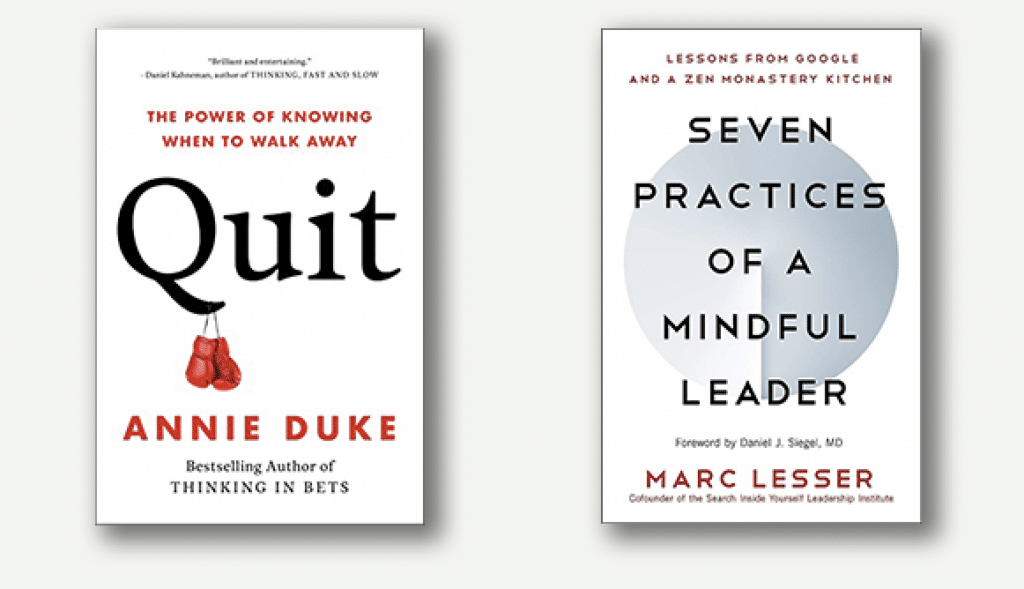It’s the fall, the season, according to the New York Times, when many longlists and finalists for major book awards are released, making many of our reading plates very full. It’s at this time of the year that I start a list for what to read in the seams of the chaotic pace of our work at ATD and in the seams of travel. Usually that reading time comes in the late spring and summer.
This is my 23rd summer reading list, a compilation of books that sparked what Monica Parker from my list calls “wonderprone” moments. I hope you find this list, as well as those on this year’s other lists and among award nominees, helpful in preparing your reading list for the upcoming year and that they help you “walk toward questions rather than away from them,” which is part of being “wonderprone.”
2023 Reading List
Nonfiction
Poverty, By America by Matthew Desmond
Desmond, also the author of Evicted (another book to place on your reading list), paints a stark picture of poverty in America and then offers reflections on solutions, solutions that community colleges can help to drive and support. My kindle edition of the book is filled with highlighting and notes. The narrative takes me to our colleges (Alamo’s big goal to eradicate poverty in the San Antonio area) and our students (I see many of our DREAM scholars). Desmond encourages each of us to become “poverty abolitionists” by “unwinding ourselves from our neighbors’ deprivation and refusing to live as unwitting enemies of the poor.” I thought about how our design as community colleges is often this unwitting enemy.
From Generosity to Justice: A New Gospel of Wealth by Darren Walker
“In ordinary times, hope is rare. But in these extraordinary times, hope is radical.” This passage by Walker, early in this book, caught my attention because of how hopeful our colleges remain in the work we do. I never conceived of our hope as radical. But it is. Walker, who is President of the Ford Foundation, makes a case that philanthropy is not action or entity, but “rather a continuum that spans from generosity of one side to justice on the other.” He encourages philanthropy to push their work beyond the former to the latter. Twenty years ago, the largest private investment ever in community colleges founded Achieving the Dream. Today, philanthropy continues to fuel the student success movement. Walker helps me see that these investments, while generous, come with a moral calling to use the support to help our colleges contribute to building a more just, inclusive, and equitable society.
The Power of Wonder by Monica Parker
Parker makes the case that modern life is taking the “wonderproneness” out of us and she includes the education system’s tendency to curb curiosity in that analysis. She speaks to wonder being both a journey and a destination and her five components of wonder—watch, wander, whittle, wow, and whoa— remind me of the journey that our ATD core and data teams often take when they start moving through the good, bad, and ugly of their data. She writes: “Wonder embraces that beautiful messy complexity of life. It allows for nuance and depth. It allows for the reality of sucktitude.”
America’s Hidden Economic Engines: How Community Colleges Can Drive Shared Prosperity edited by Robert B. Schwartz and Rachel Lipson
Produced as a result of Harvard University’s Project on Workforce, this book includes five case studies of community colleges (four are ATD colleges) that prioritize career advancement for all learners across all programs — credit and non-credit. They achieve this through close partnerships and program alignment with regional labor market needs, positioning themselves at the heart of shaping the prosperity of their communities. While the stories are unique and local, these five colleges share some similarities in approach, especially in their strategic use of quantitative and qualitative data, in the systemic organizational structural changes they pursue to reduce credit and non-credit silos, in their focus on shaping student supports for all learners, and in the ways their leadership interacts with the regional economic development ecosystem.
South to America: A Journey Below the Mason-Dixon to Understand the Soul of a Nation by Imani Perry
Perry, through compelling and personal storytelling, explores the history and culture of regions of the south from Appalachia to North Carolina to Nashville and Memphis to New Orleans and Florida. Perry brings to light points of common ground and tension across race and class in each story. She asserts: “There is a simultaneously guarded color line and an ease between Black and white in the South.” In reading the book, I got a stronger sense of the context of the work of community colleges in the South, the contradictions within which our work rests (“The South is home to some of the richest queer culture in the world and some of the deepest intolerance to any order other than patriarchy.”), and of how the resiliency of local culture and power structures can make transformation for our colleges even more challenging than we already know it to be.
Fiction
The Magician by Colm Toibin
Toibin is a favorite of mine (I loved Brooklyn). As the reviewers note, this is a “big novel that waxes and wanes.” It is the waxing and waning that kept me engaged. In The Magician, Toibin dramatizes the life of Thomas Mann. It is his second novel to breathe life into writers of the past. His first, titled The Master, was about Henry James.
The Sentence by Louise Erdrich
Wow! I could not put this one down with its series of improbable turns of events. Plus, it’s set in an independent bookstore, one of my favorite places.
Memoir
A Place Called Home by David Ambroz
A powerful read about growing up homeless and in foster care, the book shares Ambroz’s journey of moving from place to place; his sexual identity, which made him a constant target; and his work now in using his graduate degree from UCLA to change the laws that affect child poverty.
The Forgotten Girls by Monica Potts
The author returns to her hometown in Arkansas to get a better understanding of why her peers are struggling. She explores a central question as to why the life expectancy of America’s least educated white women has been shrinking as they die of “diseases of despair.” It reminds me of The Other Wes Moore.
Other Notable Reads
Quit: The Power of Knowing When to Walk Away by Annie Duke
Duke makes a case that getting good at quitting is integral to success. She gives excellent examples from entrepreneurs, CEOs, and athletes of how to determine when to suspend time and effort on a project or new idea that is not working so that we can move forward with new energy on new ideas.
Seven Practices of a Mindful Leader by Marc Lesser
Lesser groups the seven practices into three categories. Investigate includes the practices of loving the work, doing the work, letting go of thinking you are right, and connecting to the pain. Connect includes connecting to the pain of others and depending on others. Integrate includes letting go of a mindset of scarcity and cultivating awe and wonder. Lesser believes that meditation and leadership are closely linked, and, after reading this book, I agree.
On My Nightstand
Firekeeper’s Daughter by Angeline Boulley
Your Brain on Art by Susan Magasamen and Ivy Ross
The Making of a Sharpeville Girl by Nthabiseng Audrey Ogude



